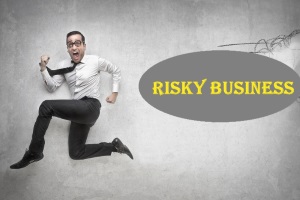
The Risky Business of Emotional Intelligence
We often think of risky business as anything that involves the possibility of something bad happening. When it comes to emotional intelligence, or as I prefer to label it emotional wisdom, I believe that the biggest risks lie in not embracing it as a critical part of our personal and professional growth. Your ability to self-reflect, get along with others, create deeper connections, get things done and succeed in life depends heavily on your level of emotional wisdom.
Are there actual risks present on the journey to becoming more emotionally wise? The short answer is yes. Anything that involves emotions, opens the door to some level of risk. Let’s look at where that level of risk lies within the four components of emotional wisdom.
Self-Awareness and Self-Management
Becoming more self-aware can be uncomfortable because it requires brutal honesty about yourself, introspection about your own emotions and your reaction to things happening around you. Knowing your strengths is easy, but acknowledging your weaknesses isn’t and it takes courage. As the saying goes, you cannot change what you don’t acknowledge and I believe that you cannot self-manage if you aren’t first self-aware. If through practicing more self-awareness for instance, you discover that when you have uncomfortable conversations with people, you tend to fold your arms the whole time. Next time consider unfolding your arms to create a more inviting body language. If on the other hand, you discover that you have a very short temper when someone makes what you perceive to be an avoidable mistake, consider giving yourself an extra five minutes before reacting. Lengthen the gap between your impulses and your action to minimize the possibility of a regrettable situation.
The good news about self-awareness is that discovering your own emotional triggers doesn’t mean you have to publicly declare them to the rest of the world. At the end of the day, your practice of self-awareness and self-management is your personal commitment to work on improving you daily. There might be a risk of a little ego bruising along the way, but the upside is that you get to know yourself better and react to things in a more self-empowering way. This makes you a more adaptable, level-headed, less stressed and productive person.
Empathy and Relationship Management
Since empathy requires you to “put yourself in someone else’s shoes”, it can be one of the most challenging aspects of emotional wisdom and yet one of the most rewarding. Practicing it is indeed the single best way to increase your emotional wisdom. It is the ‘social glue’ in all relationships because it helps you create more meaningful connections with others. It might feel inconvenient at times to “put yourself in someone else’s shoes” especially if it calls for you to move from the comfort of your perspective to make someone else feel understood. Like you might have to do, if you were sharing critical feedback with someone on your team who is far more sensitive than others.
I believe that the real risk of empathy is not taking risks to move over to someone else’s perspective, to appreciate where they are coming from. Examples of this can sometimes be seen in our homes, our workplaces and even in the hostile U.S, political environment, where folks in Congress hold steadfastly to their perspectives and positions no matter what, and often at the expense of progress and meaningful growth.
Empathy does require patience and understanding, and sure it might feel a little uncomfortable at times, to force yourself to view things from another’s lens, but choosing not to be empathetic opens the door to interpersonal conflicts and misunderstandings. You can indeed step out to see things from where someone else stands without losing your own ground.
Being empathetic gives rise to great relationship management skills, as it increases your ability to bring the best out in others regardless of personality type. Relationship management involves truth-telling and that can sometimes be uncomfortable. If you are in a leadership position for instance, giving feedback can present a work-relationship risk. There are risks involved in delivering that feedback in a way that inadvertently creates victims who end up spending more time ‘licking their wounds’ while soliciting sympathy from others, than they do on working to improve upon things they justifiably should improve.
When people feel understood, they are more likely to cooperate and contribute. At the heart of developing others and building bonds, the more self-aware, self-managed and empathetic you are, the better you will be at this important social skill of managing relationships productively. That is worth the risk.

Hi, this is a comment.
To get started with moderating, editing, and deleting comments, please visit the Comments screen in the dashboard.
Commenter avatars come from Gravatar.